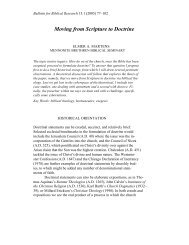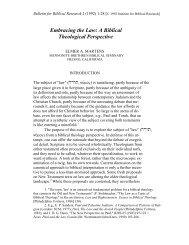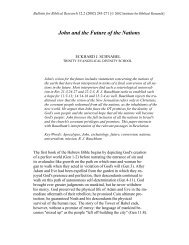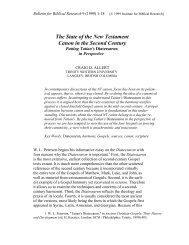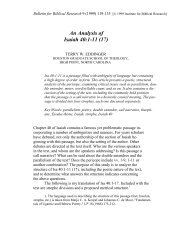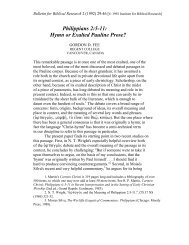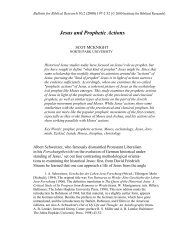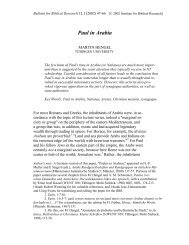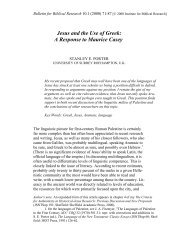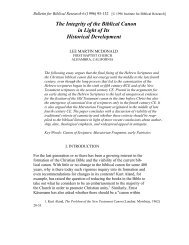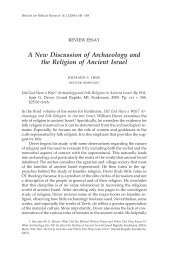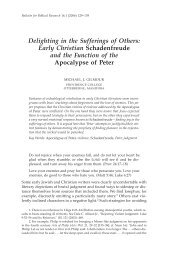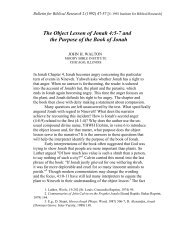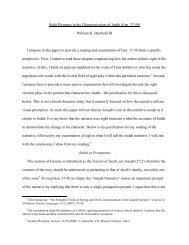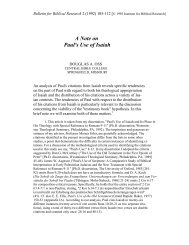Beyond the Grave - Institute for Biblical Research
Beyond the Grave - Institute for Biblical Research
Beyond the Grave - Institute for Biblical Research
You also want an ePaper? Increase the reach of your titles
YUMPU automatically turns print PDFs into web optimized ePapers that Google loves.
BLOCK: Ezekiel's Vision of Death and Afterlife 133<br />
oracle. Although <strong>the</strong> occasion <strong>for</strong> this prophecy is declared in v. 11,<br />
viz., <strong>the</strong> loss of hope by <strong>the</strong> prophet's fellow exiles, <strong>the</strong> seeds of this<br />
vision have actually been planted earlier. In fact, in this passage we<br />
recognize ano<strong>the</strong>r example of Ezekielian Wideraufname, with 37:1-14<br />
offering an expansion on 36:26-27, where <strong>the</strong> subject of Yahweh's<br />
infusion of his Spirit (rûah) had been first introduced.<br />
The prophet begins by recounting how he is brought in visionary<br />
<strong>for</strong>m to a vast valley, white with <strong>the</strong> bones of humans long de-<br />
ceased. The issue of <strong>the</strong> vision is presented in direct interrogatory<br />
<strong>for</strong>m by Yahweh himself: "Can <strong>the</strong>se bones live?" (v. 3). After defer-<br />
ring to Yahweh <strong>for</strong> <strong>the</strong> answer, through a series of miraculous<br />
events <strong>the</strong> prophets discovers that <strong>the</strong> question is to be answered<br />
with an enthusiastic "Indeed!" Infused with <strong>the</strong> breath of Yahweh,<br />
Israel can—nay, she will live again!<br />
But <strong>the</strong> question <strong>for</strong> us is, what does this text say about Ezekiel's<br />
perception of death and afterlife? Without entering into a detailed<br />
discussion, we offer <strong>the</strong> following brief observations:<br />
First, <strong>for</strong> Ezekiel (as <strong>for</strong> o<strong>the</strong>r prophets) death represents <strong>the</strong><br />
punishment <strong>for</strong> spiritual infidelity. Because Israel had not kept Yah-<br />
weh's covenant, he had imposed its curses upon <strong>the</strong>m. 115 Second, <strong>the</strong><br />
Israelites may take hope because <strong>the</strong>re is life after death. God sees<br />
<strong>the</strong>ir present hopeless condition and cares about <strong>the</strong>ir welfare. And<br />
he has <strong>the</strong> power to revive <strong>the</strong>m and to return <strong>the</strong>m to <strong>the</strong>ir native<br />
soi1. 116 Death and <strong>the</strong> grave need not keep <strong>the</strong>ir sting (see Hos 13:14)<br />
because <strong>the</strong> Creator of life and <strong>the</strong> divine patron of Israel, not Neb-<br />
uchadnezzar, holds <strong>the</strong> key to <strong>the</strong> nation's future. Third, <strong>the</strong> means<br />
whereby <strong>the</strong> corpses are revitalized is by being infused with Yah-<br />
weh's own life-giving spirit. 117 This is how <strong>the</strong> first lump of clay<br />
115. V. 9 indicates <strong>the</strong> bones are <strong>the</strong> remains of hahărûgîm, "<strong>the</strong> slain," that is vic-<br />
tims of battle; hence W. Baumgartner's designation of this text as a Schlachtfeldsage<br />
(Zum Alten Testament und seiner Umwelt: ausgewahlte Aufsätze [Leiden: Brill, 1959] 361).<br />
The fact that <strong>the</strong> corpses had been left exposed <strong>for</strong> <strong>the</strong> vultures and hyenas suggests<br />
that <strong>the</strong>y were <strong>the</strong> objects of some horrendous curse. Cf. F. C. Fensham, "The Curse of<br />
<strong>the</strong> Dry Bones in Ezekiel 37:1-14 Changed to a Blessing of Resurrection," JNSL 13<br />
(1987) 59-60. One of <strong>the</strong> curses in Esarhaddon's vassal-treaty with Ramataya of<br />
Urakazabanu provides an extrabiblical analogue: "May Ninurta, leader of <strong>the</strong> gods,<br />
fell you with his fierce arrow, and fill <strong>the</strong> plain with your corpses, give your flesh to<br />
eagles and vultures (Fensham translates "jackal") to feed upon" (ANET, 538). Similar<br />
curses hung over <strong>the</strong> Israelites if <strong>the</strong>y should break <strong>the</strong>ir covenant oath with Yahweh.<br />
Cf. Deut 28:25-26; Jer 34:17-20.<br />
116. Cf. D. E. Demson, "Divine Power Politics: Reflections on Ezekiel 37," in<br />
Intergerini Perietis Septvm (Eph. 2:14): Essays Presented to Markus Barth on his Sixty-fifth<br />
Birthday (ed. D. Y. Hadidian; Pittsburgh: Pickwick, 1981) 97-110.<br />
117. Cf. our discussion of <strong>the</strong> role of Yahweh's rûah in "The Prophet of <strong>the</strong> Spirit:<br />
The Use of rwh in <strong>the</strong> Book of Ezekiel," JETS 32 (1989) 27-49, especially pp. 34-41 on<br />
<strong>the</strong> rûah as "agency of animation."



